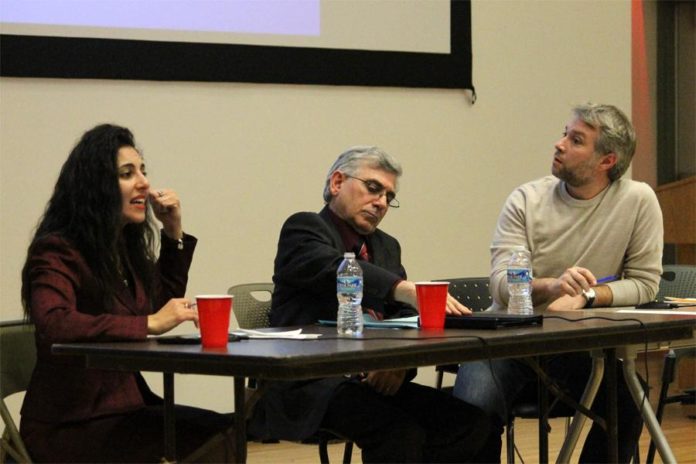Topics concerning the issues in the Middle East flew on Monday night’s panel discussion, “Promises and Perils: Perspectives on Social Changes in the Middle East.” Issues pertaining to current events in both Egypt and Turkey were discussed in depth.
Prompter and moderator was Dr. Eric Tuten, from SRU’s history department. Participants in the discussion included conference organizer, Dr. Aksel Casson, from the department of professional studies and interdisciplinary programs, Dr. Abbas Noorbakhsh, professor in SRU’s School of Business, and guest participant Marwa Maziad.
Maziad is a current doctoral candidate for civil military relations in Egypt and Turkey at the University of Washington. She grew up in Cairo, Egypt, and travels there often. The University of Cairo is also where she received her Bachelor of Arts degree. She is currently a columnist for Almasry Alyoum (Egypt Today), most recently writing on domestic internal affairs.
Maziad enjoyed participating in the discussions, which aimed at helping the younger sector of the U.S. population understand foreign events.
“I’m glad American students are interested in affairs outside of their own country,” Maziad said.
Maziad met the coordinator of the conference, Dr. Casson, while they both attended the University of Washington. Casson has now been a professor here for three years. Through Maziad’s article link on her Facebook, titled “From Tahrir to Taksim Square,” Casson reconnected with her. SRU then reached out and inquired if she would join the seminar.
The discussion began with Dr. Tuten’s introduction of the topical issues, and their geographical locations. After introducing the panelists, he prompted them with the first question, to analyze the events that have taken place in Egypt recently. These events included the election, protests, and the eventual overthrow of Mohamed Morsi. He was the country’s first president elected by democratic process. Some of these remonstrations have been violent, Tuten noted.
“These protests are being led by the young demographic in Egypt,” Casson reminded the panel and listeners. He made it clear that it is the young population looking for a revolutionary, liberal Egypt.
“Egypt is in transition, and will be for some time,” Maziad said, “As the people are saying now, ‘the ceiling of fear has been broken.’”
Now that the Egyptian military has removed Morsi from office, along with the support of nearly 22 million people, he is on trial for incitement to murder. Maziad highlighted that the majority of Egyptian people no longer live in fear of their government and are ready to revolutionize.
As the focus shifted to Turkey, Maziad explained their disputes as “not a reflection, but a refraction” of those in Egypt. It is not the same exact situation, but by witnessing the other actions, Turkey has gained their own strength. They, too, had anti-government protests this year. Their Islamist Justice and Development party (AKP) had held office since 2002, with Prime Minister Recep Tayyip Erdoğan as their representative since 2003.
Recently, the Turkish people have decided that Erdoğan and the government have acquired an authoritarian way of rule. The people expressed that he has been attempting to bring too much unhelpful change to their country by protesting. Casson attested to that by saying, “winning an election does not mean you can make sweeping changes.”
Gender was also a topic that was addressed, and for freshman art major, Megan Hulings, 18, it was one of her reasons for attending the event.
“My interests lie in women’s rights, and the idea that Western feminism differs from Eastern,” she said.
The panel also answered some of the questions Hulings asked. When about 5,000 people occupied an area of Cairo for three weeks, they were not just men and women. Maziad described this surge of people, and made it clear that they were not separated by gender, something Hulings had wondered. Maziad said that they moved, thought, and acted as one. This was a significant event in Egypt’s history which proved that women were completely equal to men. There are hopes that this equality can continue to express itself, Maziad said.
For promises of a better future, the people of these Middle Eastern countries put themselves into perils. Maziad expressed that, if there is one sure resolution, it is “a strong state and a strong society.”








